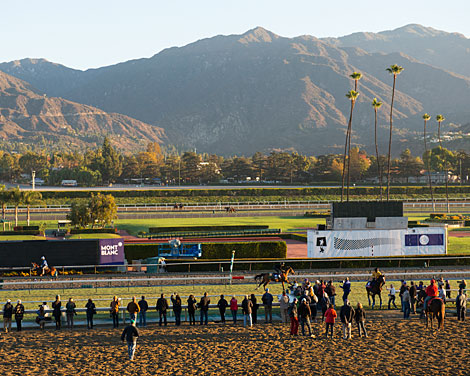
Photo by Anne M. Eberhardt
ARCADIA, Calif. -- (Nov. 1, 2013) Photographers are setting their remotes. Reporters are filing into the press box. Sun up over the San Gabriel mountain range. The buzz is rising. It's Breeders' Cup Friday, and if you can't enjoy horse racing's Super Bowl at Santa Anita, you might as well get out of the sport.
Fort Larned, Mucho Macho Man, Game On Dude in the Classic. Royal Delta and Princess of Sylmar (and Beholder!) in the Distaff. Who do you like? Who looks good? Post positions, track conditions, speed figures, current form. Prognosticating.
It's been a long week of lead-up, breaking news and features. Early mornings on the backside at the gap, late mornings through the barns and stalls of champions. Groupie Doll looks like a million dollars, she's worth more. Mizdirection hasn't bitten off anyone's fingers... yet. Wise Dan kicked up his heels. Will Take Charge schooled in the gate. The Fugue strolled through the paddock. These, and more -- 169 of them -- are the stars of our game.
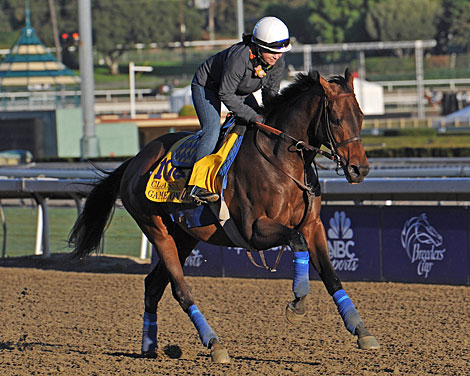
Game On Dude - Photo by Rick Samuels
Loose horse on the training track. Loose horse on the main. Last-minute scratches. Rumors. Facts. We cover these things and cover them well, interviewing breeders, owners, trainers, jockeys, chasing down the story. We document the history of the sport. We watch it happen.
On a seemingly long-ago Monday at the post position draw press conference, I asked a panel of trainers to think back to the days when this was the dream, not just life as they know it. I was looking for something beyond the b.s., something more than "he couldn't be training any better" and "it was exactly what we wanted." And for me, at least, the answers they gave felt like the only real moment the PR whirlwind -- because when you look back to where you came from and remember how much you wanted to be here, it helps you appreciate where you are.
"It's always been horses for me, forever and ever," Eric Guillot said. "I don't think there's been a time in my life since I was four or five years old that I haven't been in the horse business. I get up at 4:30 a.m. every morning and love to get to work. I hate taking vacations. I hate going anywhere. I miss my horses when I'm away from them for more than 24 hours."
"It wasn’t a moment for me, it’s been my whole life," Kathy Ritvo said. "I’ve always loved the horses, done the races; it’s just exciting, it’s what I love to do."
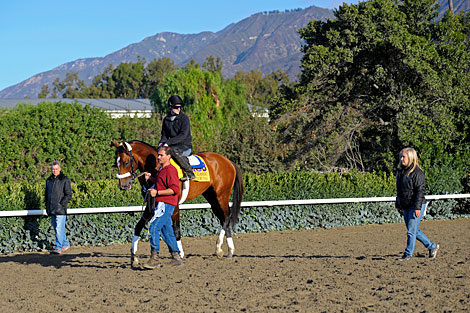
Kathy Ritvo watches over the training of Mucho Macho Man - Photo by Anne M. Eberhardt
And back before there was glory, there were horses who brought joy at the lower levels, and racing them took just as much work as racing the champions, just as much care.
"My father and I owned a horse named Battle Calling," said Hall of Fame trainer Richard Mandella. "Won us about 13 races, in the money second or third about as many times. And he was a mathmetician. He knew when he ran for $2,500 he could win, ran for $3,500 he’d be second or third, and if you ran him for $4,000 he was fourth. We kept him right down their throats and we had a great time with him."
But the goal is always higher, the best of the best.
"We think about this series and the Triple Crown 365 days a year," Hall of Famer D. Wayne Lukas said. "We wake up every day focused on trying to do well in the Breeders' Cup series and in the Triple Crown races and in the other Grade Is. This is where our clientele wants us to be, this is what fuels the fire, so we don’t let a day go by that we don’t think about it. We’ve already checked on the yearlings to see how their attitude is and if any of them have any ability."
And the idea of reaching for glory fosters the development of superstars.
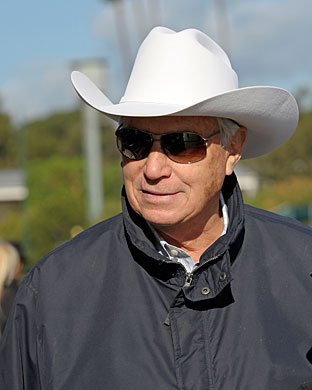
D. Wayne Lukas - Photo by Anne M. Eberhardt
"That's how I got involved with Thoroughbreds," another Hall of Famer, Bob Baffert, said. "I remember when Wayne made the jump to Thoroughbreds. When he came into the Quarter Horse world he was like a whirlwind; he just took over the whole sport. He changed Quarter Horse racing, changed the Thoroughbred world. And I just always thought 'there’s no way, I can’t follow him over there.'
"But I just happened to be watching the Breeders' Cup inaugural running, I’ll never forget watching. They had these different races, the sprint, the grass, these European horses... I thought 'wow!' It was just the most awesome racing and awesome show. I thought, 'Well, maybe I can’t win a Kentucky Derby, but maybe I can get in there and win the sprint or get involved somehow.' The Breeders' Cup is what really left impression on me, like, 'You know what, I’m going to give it a try. I won my first Breeders' Cup race (the 1992 Sprint) with the first Thoroughbred I ever bought (Thirty Slews). That’s luck."
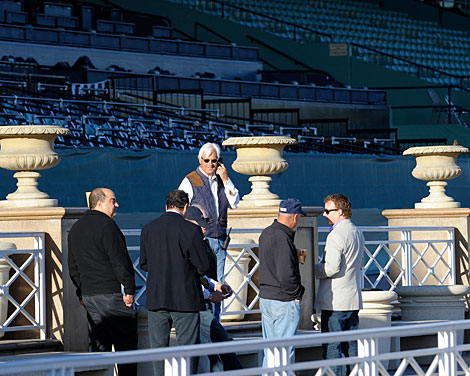
Bob Baffert - Photo by Anne M. Eberhardt
And then there's camaraderie, and the journey together, looking back over the years to remember where we were and how far we've come. And, always, the personalities.
"I wish I'd known him well enough when he was making the decision (to get into Thoroughbred racing); I would have told him to stay with the Quarter Horses," Mandella joked of Baffert's success.
"I actually talked to a jockey agent who lives here and another trainer," Baffert said. "I go, 'I'm thinking of coming over.' They said, 'You know what, stay where you’re at; you’re doing better where you’re at, don’t even think of coming over."
"It was just the opposite when I left Los Alamitos; everybody helped me pack -- they even loaded the horses," Lukas laughed.




